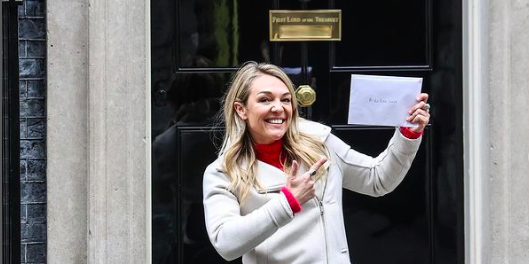The government has announced plans to change the law to better protect air passengers with disabilities, following the #RightsOnFlights campaign led by author and TV presenter Sophie Morgan.
The “Loose Women” star was paralyzed from the chest down after a car accident at age 18, but has been a long-time advocate for disability rights.
She officially launched the campaign after her wheelchair was badly damaged after a flight in January, and earlier this month she posted an emotional video on Instagram revealing that her wheelchair had broken down, yet again.
A campaign backed by Disability Rights UK and Marion Fellowes MP has since highlighted the barriers disabled people face when flying, and a petition calling for reform was sent to Downing Street in March.
“Woke up to the news that the UK Government are planning to change the law to protect disabled people when flying,” Sophie tweeted this morning, highlighting the success of her campaign.
So, what has changed?
The news was announced in the Government’s response to a consultation with airlines, campaigning groups and individuals launched last year.
The reforms also include plans to allow the Civil Aviation Authority to impose fines on airlines that do not meet their obligations to disabled travellers.
All passengers with disabilities or reduced mobility are already entitled to what is known as “special assistance”, but the campaign relied on the premise that assistance is inadequate, with assistance not being provided properly or vital mobility equipment being broken.
The government acknowledged this in its response to the consultation, saying: “Passengers with disabilities and reduced mobility needs to be able to travel without fear of damage to their wheelchairs or mobility devices.” […] We will continue to work with the industry on ways to ensure this type of equipment is handled appropriately to minimise risk.”
It added: “If damage or loss occurs, it is clear that the disruption and distress can be significant. We hope that passengers receive full compensation in a timely manner, commensurate with the value of their items and the damage caused.”
The planned reforms would mean there would be no cap on compensation for damaged wheelchairs and mobility aids on domestic UK flights, and airlines would be encouraged to remove the cap on international flights as well.
This is a significant change from current law, under which airlines do not have to cover the full cost of repairs if a wheelchair is damaged while it is checked in.
Why the news matters to wheelchair users
For Tanvi Vyas, aviation group leader for the Disability Transportation Advisory Committee, providing adequate relief is essential.
“If your equipment is damaged it doesn’t just ruin your short-term plans for the trip itself – it’s really important to understand the long-term impacts physically, mentally and financially,” she said.
While the initial legislative changes are expected to ensure passengers with disabilities can travel safely and with peace of mind, Morgan’s work doesn’t stop there: the ultimate goal of the campaign is to push for the redesign of aircraft to promote inclusive air travel for all.
“This is a small victory on the long road to change,” Morgan wrote on Instagram.
That’s true, but it’s something worth celebrating.
Related
Source link

